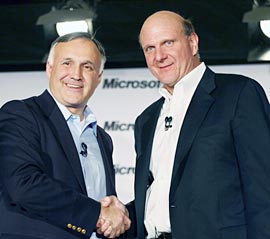Novell's patents bought by Microsoft, Apple, EMC, & Oracle


As my buddy Mary Jo Foley pointed out, this means that "CPTN Holdings isn't just a front for Microsoft." It's easy, of course, to see why Microsoft would want Novell's IP. While we don't exactly what patents came with this deal, we do know that Novell owns significant networking, directory, virtualization and data center patents.
Still it's hard to see exactly why this quartet of companies would work together on this IP purchase. As Florian Muller, who first revealed CPTN's members in his FOSS Patents blog wrote, "I don't know much about EMC other than that it's a very significant company. I do know that Apple and Oracle are clearly companies who have different approaches to some important issues than Microsoft. Within the consortium, the four players will have to agree on a common denominator concerning the patents to be acquired. They've apparently been able to agree that those patents are valuable assets to own."
I do know EMC. Ironically, EMC is VMware's parent company. You know the other company that wanted to buy Novell. EMC and VMware both have deep interests in virtualization and the data center. Apple is the company that I don't see fitting into the CPTN partnership.
For that matter, I, and others, are still hearing rumors that VMware may yet be in running to buy Novell despite the Attachmate/Novell deal. Indeed, I was to talk to Novell's brass about the Attachmate acquisition this week, but that conversation was put off because there were still acquisition-related meeting happening.
Whether the Attachmate's dark-horse purchase of Novell goes through or not, CPTN Holdings will end up with Novell's patents. As Andrew 'Andy' Updegrove, a founding partner of Gesmer Updegrove, a top technology law firm, explained if the Attachmate deal doesn't go through because VMware or another buyer steps in, "CPTN has the right to cherry pick the Novell patent portfolio. Of course, Novell will also have $450 million in cash, so assuming that this is fair value, the Novell stockholders should be happy."
I should point out at this point that, regardless of how this part of the deal works out, the Unix copyrights stay with Novell and its eventual new owner. Microsoft and its CPTN partners get some patents, not Unix's IP.
That said, I still see Microsoft as the real winner in the Novell deals. No, Microsoft didn't buy Novell-that would have triggered an anti-trust suit that Microsoft needed like a hole in the head.
Nevertheless, the deals do keep Novell's SUSE Linux out of Microsoft's rival VMware hands. Yes, VMware and Microsoft are more enemies than friends these days. VMware has made it clear that they'd like an operating system to bundle with their virtualization systems and Microsoft wants VMware customers for its Hyper-V virtualization and Azure cloud offerings. Indeed, today, December 16th, it was announced that Novell "had joined the Microsoft Windows Azure Technology Adoption Program to address cloud security challenges through the Novell Cloud Security Service."
You see, I think Microsoft needs a friend, a junior-partner if you would, in Linux, and Novell, under the nominal ownership of Attachmate is it. As for the patents, Microsoft, EMC and Oracle will all find good uses for them, or at least, can avoid lawsuits based on them. And Apple? Darned if I know what they're doing in this deal. Any guesses? Anyone? Bueller? Bueller?